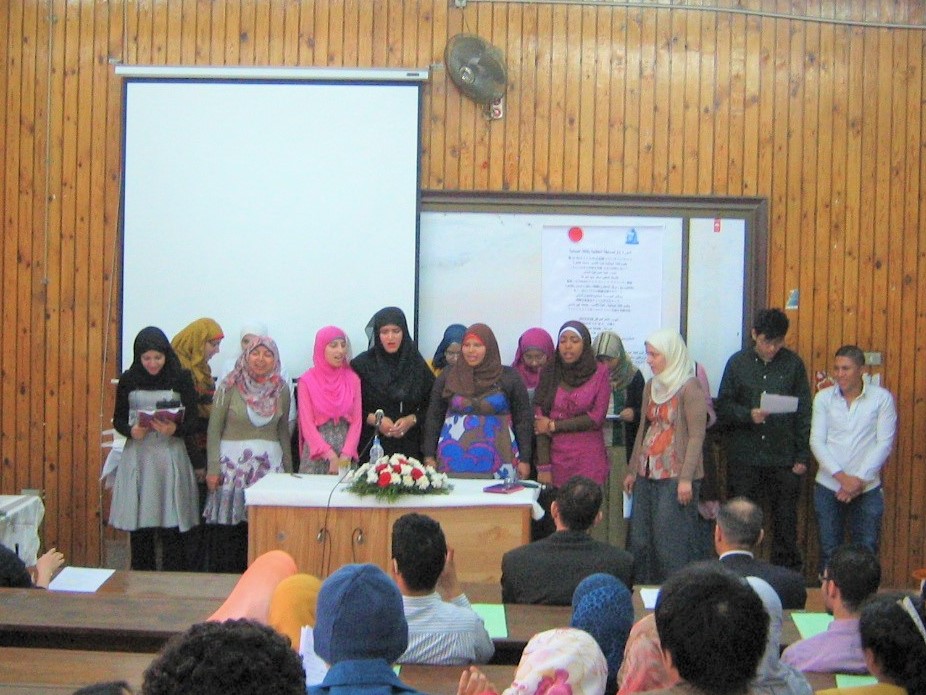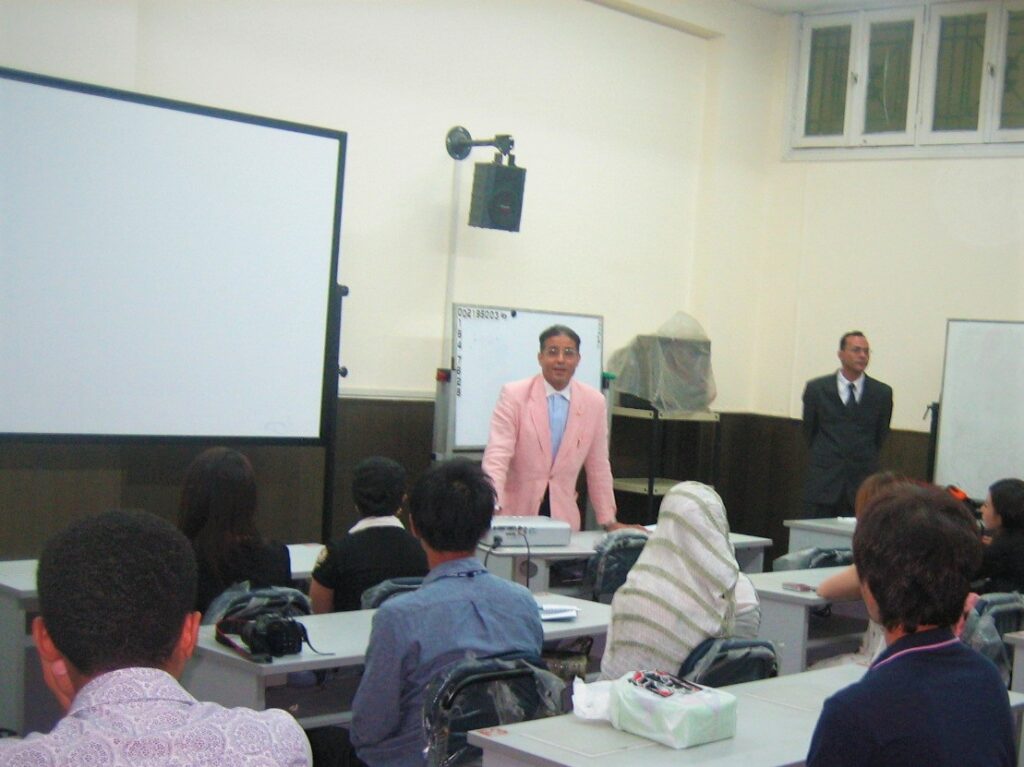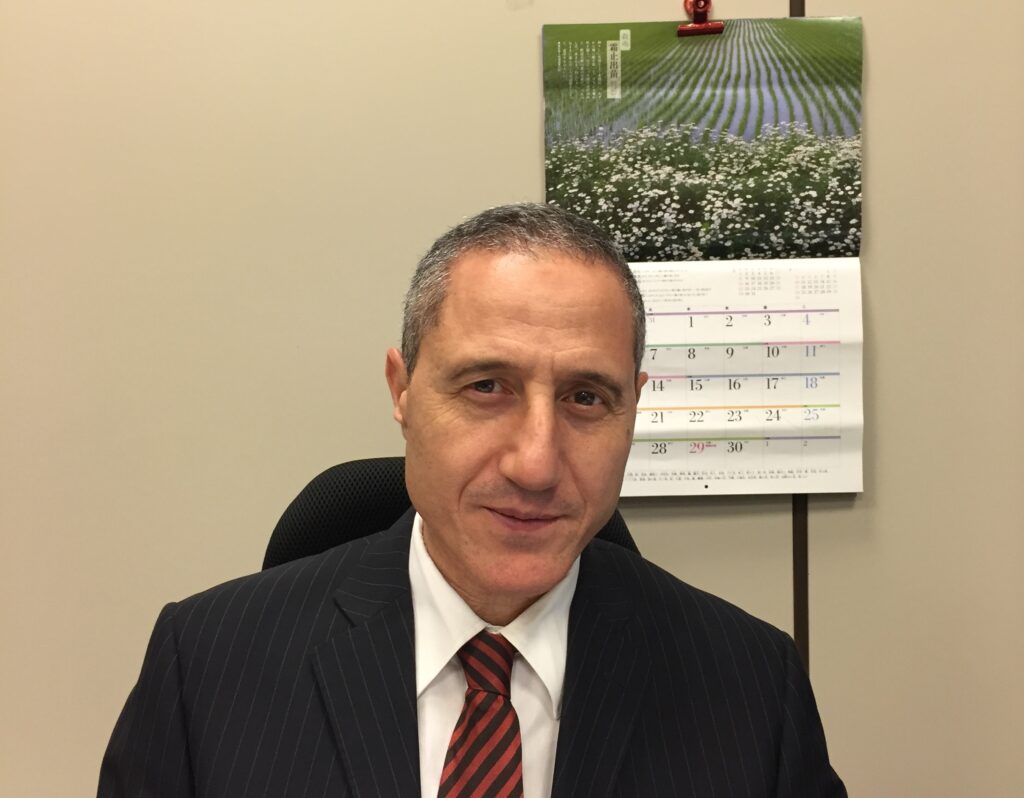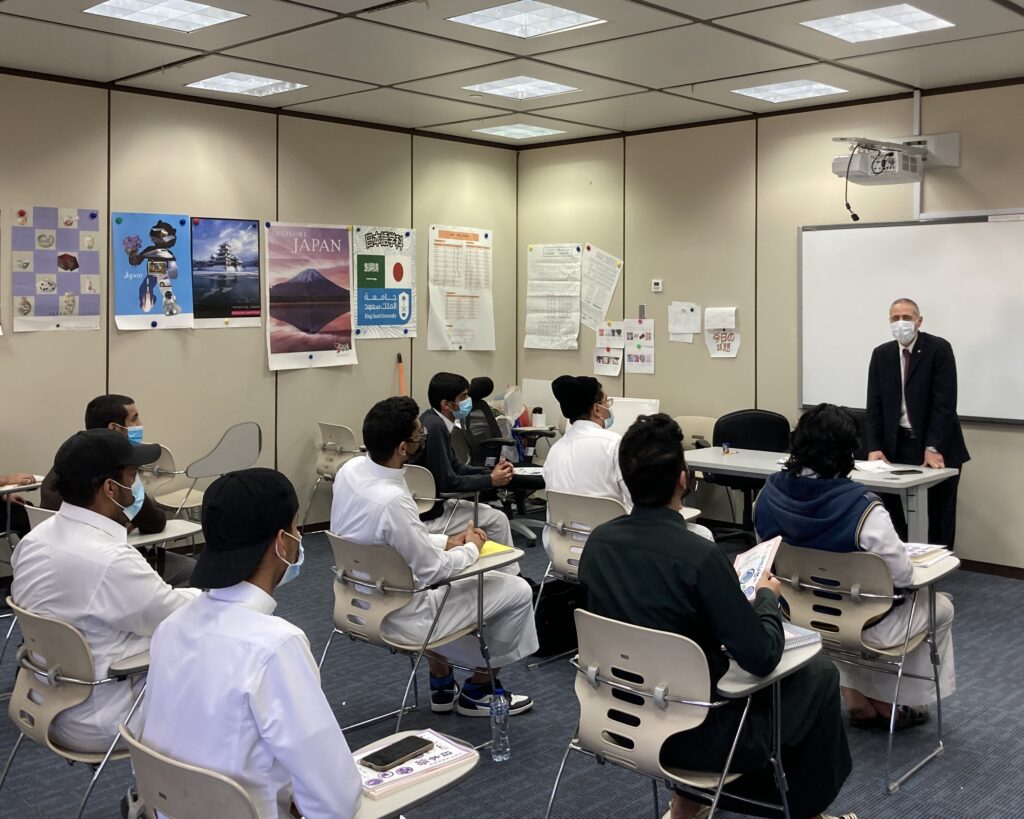2022.10.12
LANGUAGEJapanese Language Education Blossoming in the Middle East from Cairo University; A 50-Year Journey Alongside the Japan Foundation

The Japanese speech contest that was held at the Faculty of Arts, Cairo University, on April 28, 2013. A total of 14 students participated, five at beginner level (2nd year students) and nine at intermediate level (4th year students).
The development of Japanese language education in the Middle East has centered around the Department of Japanese Language and Literature at Cairo University in Egypt, which was established with support from the Japan Foundation. This article traces the journey of Japanese language education and Japanese studies, which are bearing fruit in the Middle East.
In 1973, the year that Japan was hit by the oil crisis, then Deputy Prime Minister MIKI Takeo visited Egypt during his tour of the Middle East. That became the impetus for the Department of Japanese Language and Literature to be established the following year at the Faculty of Arts of Cairo University, Egypt’s premiere academic institution, becoming the first of its kind in the Middle East and Africa. From the outset, the Japan Foundation (JF) began dispatching Japanese Language Specialists to the university in order to contribute to the development of Japanese language education in the Middle East, and at times there were four such specialists dispatched in a year.
Later, in response to the growing demand for Japanese language education in the Middle East, Cairo University began dispatching Japanese language instructors to other institutions in Egypt and other countries in 1989, and in 1994, it opened a graduate school from which many post-graduates have earned their doctorates. In addition, the Japan Foundation, Cairo was established in 1995 as an important pillar of the Japanese language education support program, further strengthening the support system for the university.
From the 2000s onward, many books and translations on Japanese culture and Japanese language learning materials have been published by Cairo University professors. In 2010, JF published “The Basic Japanese-Arabic Dictionary,” which was translated by four of the university’s lecturers. This was long awaited by learners of Japanese, as, until then, there had been no practical dictionary for use by Arabic speakers studying Japanese.
Thanks to JF’s continuing support and the efforts of local teachers, the environment for Japanese language education is steadily improving and the effects are also spreading to nearby Saudi Arabia. The dispatch of Japanese language specialists from JF ended in fiscal 2010, and the university became independent as a Japanese language education institution. In recognition of the university’s significant achievements in Japanese language education in the Arabic-speaking world, JF awarded the Japan Foundation Award 2011 for Japanese Language to the Department of Japanese Language and Literature in the Faculty of Arts at Cairo University.
More Students Pursuing Japanese Literature Studies at Cairo University
We spoke with Dr. Karam Khalil Salem, professor emeritus at Cairo University and former cultural counselor at the Embassy of Egypt in Japan, about the ties between JF and the Department of Japanese Language and Literature at Cairo University, which have been working together for 50 years. “Many students come from Saudi Arabia, Syria and African countries to study Japanese at Cairo University. The Japan Foundation and the university have also dispatched Japanese Language Specialists to other universities in Arabic-speaking countries. In addition, the university has regularly hosted Japanese speech contests and international symposiums on Japanese language with the support of the Japan Foundation.” Dr. Karam was also dispatched from Cairo University to King Saud University in Saudi Arabia from 1993 to 2002, where he worked hard to improve the environment for Japanese language education.

Dr. Karam Khalil Salem. Professor Emeritus of Japanese Language and Literature, Faculty of Arts, Cairo University. Doctor of Literature. He chaired the department for eight years in total, from 2003-2005 and 2009-2015. He has contributed to the development of Japanese language education in the Middle East by helping to establish Japanese language departments in educational institutions in Egypt and other countries.
Dr. Karam describes the evolution in the motivation of his students to learn Japanese. “As Egypt has a thriving tourism industry, many of the early students who aspired to study Japanese at Cairo University were thinking of working as tour guides or travel agents. On the other hand, there is also a segment of the population that is genuinely interested in Japanese culture, as the drama ‘Oshin,’ which became very popular in the Middle East in the 1980s, and the anime ‘Captain Tsubasa’ that was broadcast in the 1990s increased the momentum to learn Japanese.”
According to a survey conducted by JF in 2018, there were 110 students enrolled in the department. “Some of our graduates have gone on to become executives in large Japanese companies. The Arab Spring and the COVID-19 pandemic have affected the tourism industry, so some guides are beginning to resume their studies at the university to become certified Japanese language teachers. The number of students wishing to study literature has also increased, which was perhaps influenced by the production of a series of textbooks on Japanese culture and literature in Arabic. Authors KAWABATA Yasunari and OE Kenzaburo are well known, and MURAKAMI Haruki is very popular, of course,” he said. Also, in Egypt, women’s social advancements are making progress, and there are many female students in the Department of Japanese Language and Literature. “Some students study modern and contemporary Japanese female writers such as HIGUCHI Ichiyo and YOSHIMOTO Banana.”
When asked what is needed to continue fostering Egyptian people’s interest in Japan, Dr. Karam replied, “Both sides should increase the number of exchange students and deepen interactions. I also think it would be good if more high-quality Japanese TV dramas were aired, as ‘Oshin’ aroused interest in Japan and the Japanese language in the past. Televisions, which can be found in the living room of every home, have great power as a catalyst for the public to become more familiar with Japan.”

In 2010, a Japanese expert from the Grand Egyptian Museum Conservation Center was invited to speak to Japanese exchange students and Cairo University students as part of a cultural experience. The photo shows Dr. Karam introducing the speaker.
Column Inserted in Japanese Language Textbook Becomes Popular
In Saudi Arabia, where Dr. Karam also taught, Japanese language education has spread since the establishment of a Japanese major course at King Saud University in 1994. Prof. Dr. Faris Shihab, who teaches Japanese at the university, recalls, “At the time, King Saud University’s College of Languages and Translation sent requests to various countries to develop foreign language personnel, and the Japan Foundation dispatched a Japanese Language Specialist from Japan in August 1993. I used to study Japanese at Cairo University and have been teaching Japanese at King Saud University since 1994.”

Prof. Dr. Faris Shihab. Professor of the Japanese Language Program at King Saud University. Obtained a Doctorate from the University of Tsukuba. In 2015, he was awarded the Order of the Rising Sun, Gold Rays with Rosette in recognition of his contribution to promoting mutual understanding between Middle Eastern countries and Japan.
When asked what interests people in Saudi Arabia who study Japanese in Japan, Dr. Faris mused, “The image of Japan is favorable due to the excellent reputation of Japanese products, the country’s economic strength during its rapid economic growth and the popularity of Japanese anime. It seems that interest in the Japanese language and culture itself has led to students studying the language. In addition, the results of a questionnaire we previously conducted showed that some students wanted to be able to introduce Islam, which is often misunderstood, in Japanese. This is a unique motivation for learning foreign languages in Saudi Arabia, which is home to the holy city of Mecca, perhaps because it is considered the mission of those born in Saudi Arabia to introduce objective and accurate information about Islam to Japan.”
“Japanese for the Arabs,” written by Drs. Faris, Karam and others, is the first fully fledged textbook designed for students of Japanese in the Arab world. We asked Dr. Faris what he focused on in the production process. “The first point is cross-cultural understanding. As students learn, they will naturally deepen their understanding of the different culture and will be able to introduce their own culture in Japanese. The columns at the end of each unit are also very popular. In order to help students communicate more smoothly with Japanese people, we have included things related to the contents of the conversational sentences that are learned in each unit. For example, in a unit discussing ‘hanami,’ we wrote about cherry blossoms and Japanese people, and in a unit on food, we introduced Japanese cuisine. I also heard that a family member of one of the students said that they too wanted to study Japanese after reading the column.”

“Japanese for the Arabs” has many example sentences that can actually be used when visiting Japan. There are also columns on Japanese culture and the Japanese language, making it enjoyable to read.
Dr. Faris said that “securing staff and teaching materials” is necessary in order to increase the number of Japanese language learners in Saudi Arabia in the future. “I have been able to continue teaching Japanese because of my connection with the Japan Foundation. I believe that the King Saud University Japanese major course would not have survived without such support as the dispatch of Japanese language teachers and subsidies for teaching materials. I would once again like to express my gratitude to the Japan Foundation. In the future, I would like to look for more opportunities for students who have studied Japanese at university to visit Japan. It is also important to secure employment that utilizes Japanese language skills after graduation. The Embassy of Japan has been very helpful in establishing contacts between Japanese companies and students, by holding events to introduce Japanese culture and speech contests, and I am very grateful for such cooperation.”
The seeds of Japanese language education have blossomed in the Middle East thanks to the efforts and enthusiasm of the local teachers. JF will continue to support the development of Japanese language education around the world and hopes that the number of learners who become familiar with Japan and Japanese culture through Japanese language education will increase further.

Dr. Faris teaching at King Saud University.
【Related pages】
A Second Home for Overseas Japanese Language Teachers, Training Programs Offered by the Japanese-Language Institute, Urawa
